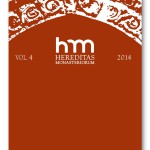À rebours et L’oblat de Joris-Karl Huysmans: entre décadence et spiritualité
Joris-Karl Huysmans’ À rebours and L’oblat: between decadence and spirituality
Author(s): Anita StarońSubject(s): Literary Texts
Published by: Laboratoire de Recherches sur l'Histoire des Congregations et Ordres Religieux (LARHCOR)
Keywords: Joris-Karl Huysmans; French literature; conversion; monastery; oblature; decadence; spirituality
Summary/Abstract: Like many other French writers at the turn of the 20th century Joris-Karl Huysmans was part of the wave of conversions to Catholicism that spread through France at the time. His case stands out, however, because it is documented in exceptional detail. The writer devoted a cycle of four novels to the topic: Là-bas (1891), En route (1895), La Cathédrale (1898) and L’oblat (1903). Their main protagonist, Durtal, gradually finds faith. Yet already in Huysmans’ previous and best known novel, À rebours (Against the Grain, 1884), we find the first manifestations of his interest in religion, particularly in monastic life. The first aim of the present article is to compare two stages – the initial and the final – of a process of rediscovery of one’s spirituality presented in À rebours and L’oblat (The Oblate). Another important issue is the vision of the Benedictine Order emerging from the latter. The author’s description of the order, the material and spiritual manifestations of its existence, is presented against the background of unrest associated with the introduction of laws concerning religious congregations in the early 20th century. The whole is filtered through the protagonist’s consciousness. Huysmans enumerates the tasks facing the Benedictines, largely relating to renovation of religious art and preservation of its existing works. At the same time he emphasises the special role that could be played in this process by oblates like Durtal, his alter ego. However, these aspirations are constantly confronted with reality, which appears increasingly dark and in the end prevents the protagonist from achieving his noble visions. This has a big influence on his pessimistic view of the world and spread of decadent elements to the spiritual sphere, which – one would think – should be free of them. On the other hand, it is clear that regardless of the external circumstances Durtal will always carry some part of des Esseintes’ personality: the decadent continues to live in the oblate.
Journal: Hereditas Monasteriorum
- Issue Year: 2014
- Issue No: 4
- Page Range: 107-123
- Page Count: 17
- Language: French

